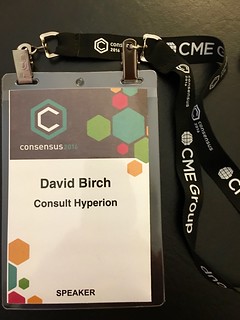To make a very great generalisation, there are two ways to get the kind of security that we need to do clever transaction stuff. We have a tamper-resistant hardware in the loop (like the chip on your EMV card or the SIM in your mobile phone) or we have to have some complicated software. This is true in the world of secure ledgers just as much as everywhere else. The obvious example is bitcoin which, since it does not use secure hardware, uses the innovative blockchain and proof-of-work consensus protocol to prevent double-spending.
Speaking at the Tomorrow’s Transactions conference in London this week, Kelly Olson, director of the distributed ledger technology group at Intel, discussed ways it is possible to use a “secure enclave”, similar to what Apple uses for its Touch ID, to increase blockchain security.
From Intel Conducting Experiments to Massively Scale Blockchain – CoinDesk
Kelly was kind enough to mention Consult Hyperion’s work for Intel on this project. We couldn’t tell you about it before, because it was confidential until very recently, but I hope Kelly won’t mind me saying that Intel’s foresight in starting this project some time ago is impressive. There are a great many people who think that blockchains are a useful way to implement a shared ledger but who don’t want the large-scale inefficiency of proof of work.
The Intel “Sawtooth Lake” project provides two consensus protocols with different performance trade-offs. One of these is “Proof of Elapsed Time” (or PoET), a lottery protocol that needs hardware security in the form of a Trusted Execution Environment (TEE). An example of such is the Secure Enclave mentioned above, another is Intel’s SGX. The other consensus protocol, Quorum Voting, is an adaptation of the Ripple and Stellar consensus. Alex Batlin from UBS provides a handy write up of these and highlights the key point about PoET:
it acts much like Bitcoin’s Proof of Work lottery consensus, but does not require nearly as much electricity expenditure. Participants can either enter low power mode whilst TEE is generating PoET and save on costs, or perform other functions if part of a cloud compute environment.
From Crypto 2.0 Musings – Proof of Elapsed Time | Alex Batlin | LinkedIn
So if there are lots of things out there with chips in them, PoET provides a more efficient consensus protocol. Is it better than the bitcoin blockchain? Well, that depends on what you want to use it for. As we have explained to our clients, the blockchain is only one way to implement a shared ledger and it is not at all clear to me that it’s the best way to implement a shared ledger for most of the applications that they are interested in. There are a growing number of other blockchain and other shared ledgers (e.g., the R3 consortium’s Corda). On the other hand, we should ignore either private or public blockchains and, in particular, the world of permissionless innovation around the blockchain deserves attention as it may be the source of radical new approaches that we can all learn from. It’s a wonderful time to be in this space and I’m looking at all of the different
Which is why I’m at Consenus 2016 in New York this week. This new classes of technologies and the new business models that it creates are of great interest to so many of our clients, and I want to learn from leaders in the field. I will, naturally, tweet my way through to show how thinking is evolving. And if you’re going to be there, I’ll be chairing the session on “Reimagining Identity” at 10.30am Monday 2nd (5th Floor, Westside Ballroom 1&2) and my colleague Salome Parulava will be chairing the session on “Preventing the Next Lehman Brothers” at the same time, same place, on Tuesday 3rd. See you all here!




